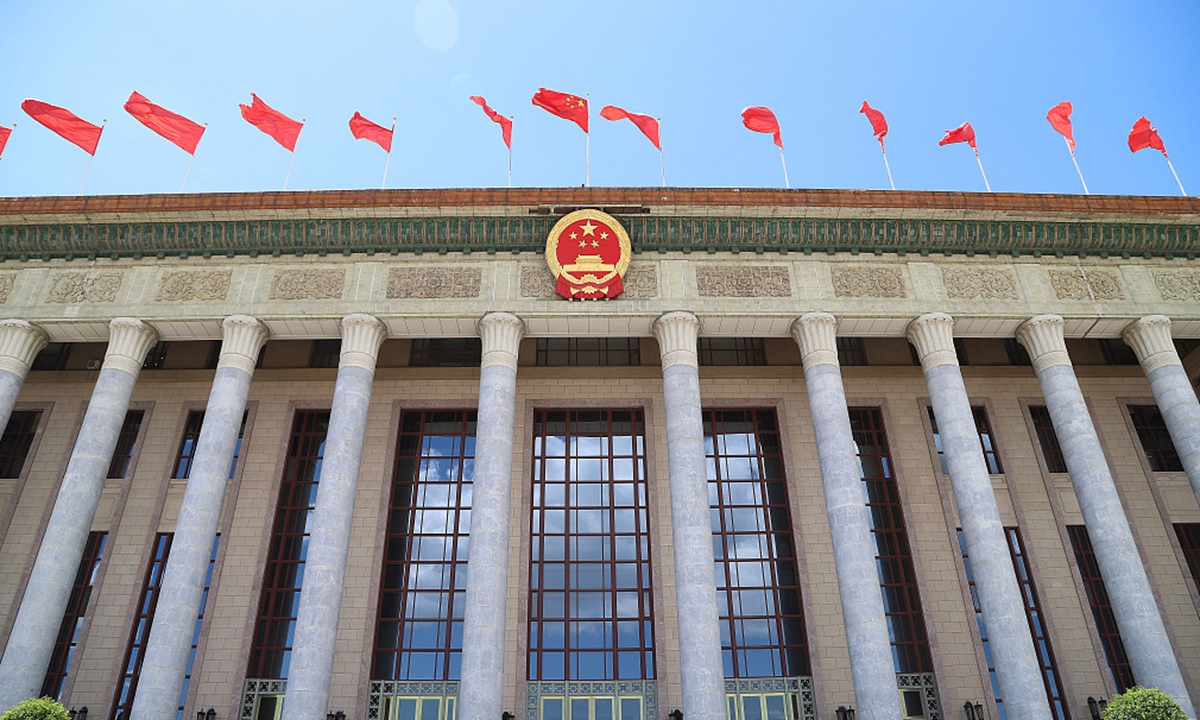West misreading of CPC’s key meeting a result of narrow-mindedness, bias
By Zhou Shaolai Source: Global Times Published: 2020/10/26 22:01:51

Great Hall Photo:VCG
The fifth plenary session of the 19th Communist Party of China Central Committee kicked off in Beijing on Monday, during which the proposals of China's 14th Five-Year Plan (2021-25) for economic and social development will be assessed.The top-level policy blueprint, however, has been considered a gesture to "show muscle" to the US amid the current escalating tensions and competition between the two countries, and would likely become an "anti-US conference," according to RFI Chinese website.
This is an extreme over-reading. The plenary sessions take place annually as a traditional practice of the Party, and the task of this year's meeting is to review the next five-year plan, which is a nationwide plan that focuses on the country's internal strategic development. In today's world where countries are closely linked with each other and share the same fate, China's development plan will affect other countries to some extent, including the world's biggest economy and one of China's most connected countries - the US. But China's plan will only focus on its own development and not be designed or adjusted against the US despite its rivalry.
China's next five-year plan is likely to place greater emphasis on strengthening its scientific and technological power, and building up its independence in key fields by increasing state support in the "bottleneck" technological projects and other important areas. China will also accelerate the adjustment of its post-epidemic economic and industrial structure, which may have a greater impact on China's foreign trade. These might be the main aspects that the US and other countries focus on regarding China's plan, as China's adjustment will have a chain reaction that will trigger the corresponding adjustment of other countries from a strategic point of view.
However, it is worth mentioning that China's plan will focus on the country's long-term development and the realization of a century-long cause, rather than making specific plans to affect or confront any other country. China's development plan has always had institutional and policy coherence with each phased plan formulated to carry on the achievements of the country's previous development, and then make reasonable adjustments for its later development, considering the domestic and international situation at the time.
The misreading of the US and other countries is mainly because they interpret China's five-year plan from the perspective of their own domestic interests and their strategic position in the overall world pattern of power distribution, which is narrow-minded and biased.
There are also those who say that the new development pattern proposed by this meeting is a move of shutting the door in the face of China-US tensions. This is also an extreme interpretation. Even though the world is undergoing profound changes, and relations between the two countries have sunk to a new low, China will never close its economy to the international community and will never be able to do so. China's economic structure has been closely linked to the global economy, and frictions with other countries in some areas will not change the direction of China's road of reform and opening-up.
Facing the changes in the global economy caused by the pandemic, China will adjust its industrial layout and the direction of the national development, focusing on stimulating the potential of domestic consumption in a market of 1.4 billion people. But it aims to better interact the domestic market with the international market, promote internal and external demand. It should not be understood as an isolation from the world.
Against the backdrop of the decoupling of China and the US and the further changes in the world pattern, the messages from the Party's meeting will be even more important. The first message is that China will continue to pursue reform and opening-up. The second is that China's path of peaceful development will never be changed, a basic position which should be highlighted to the world at the time when international relations are increasingly strained. But the world should also know that China is not afraid of provocation even though it does not stir up trouble. When the country's core interests are threatened or damaged, China will vigorously defend them empowered by the five-year plan.
The author is deputy dean of the School of Government at University of Chinese Academy of Social Sciences. opinion@globaltimes.com.cn
Posted in: VIEWPOINT